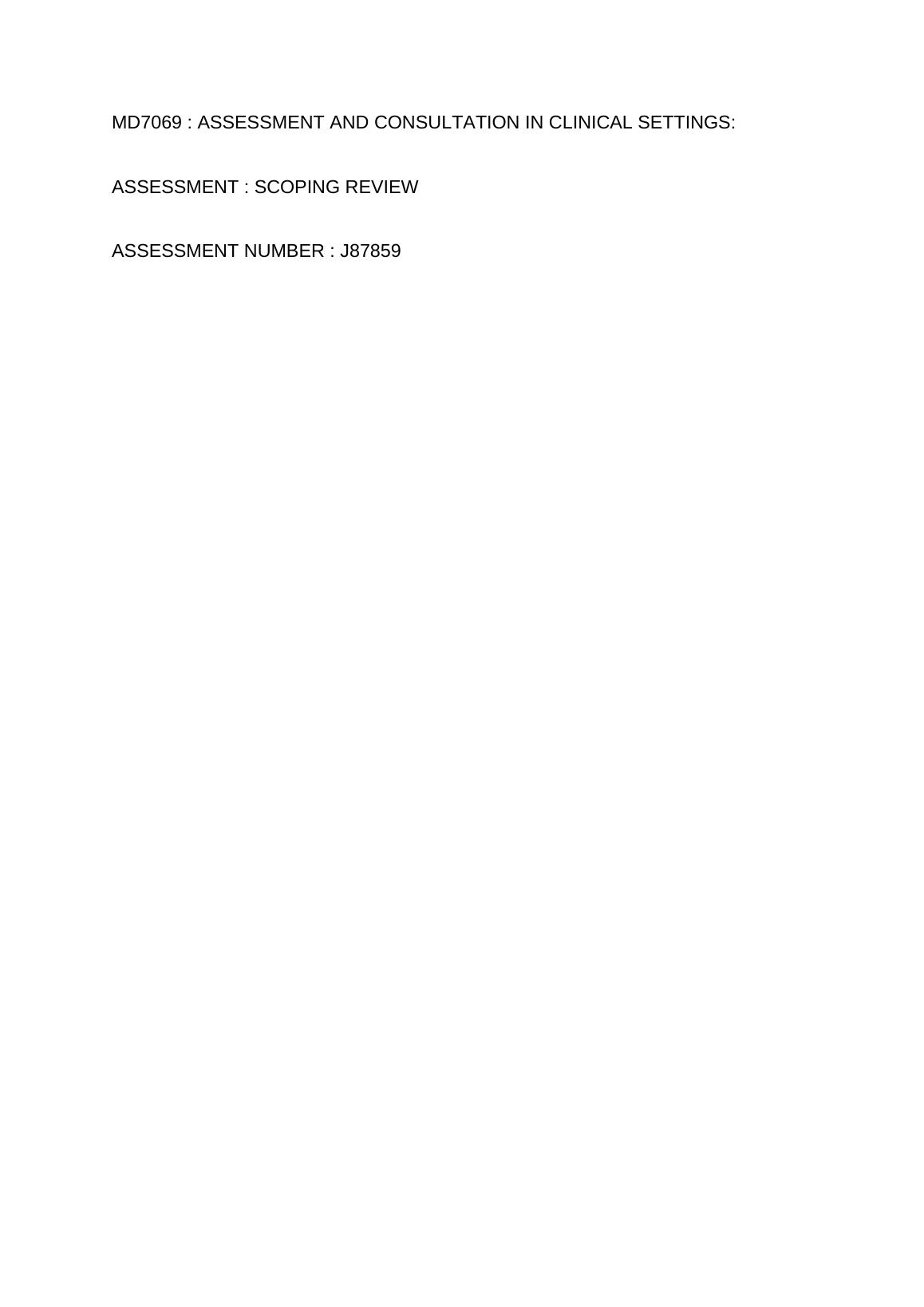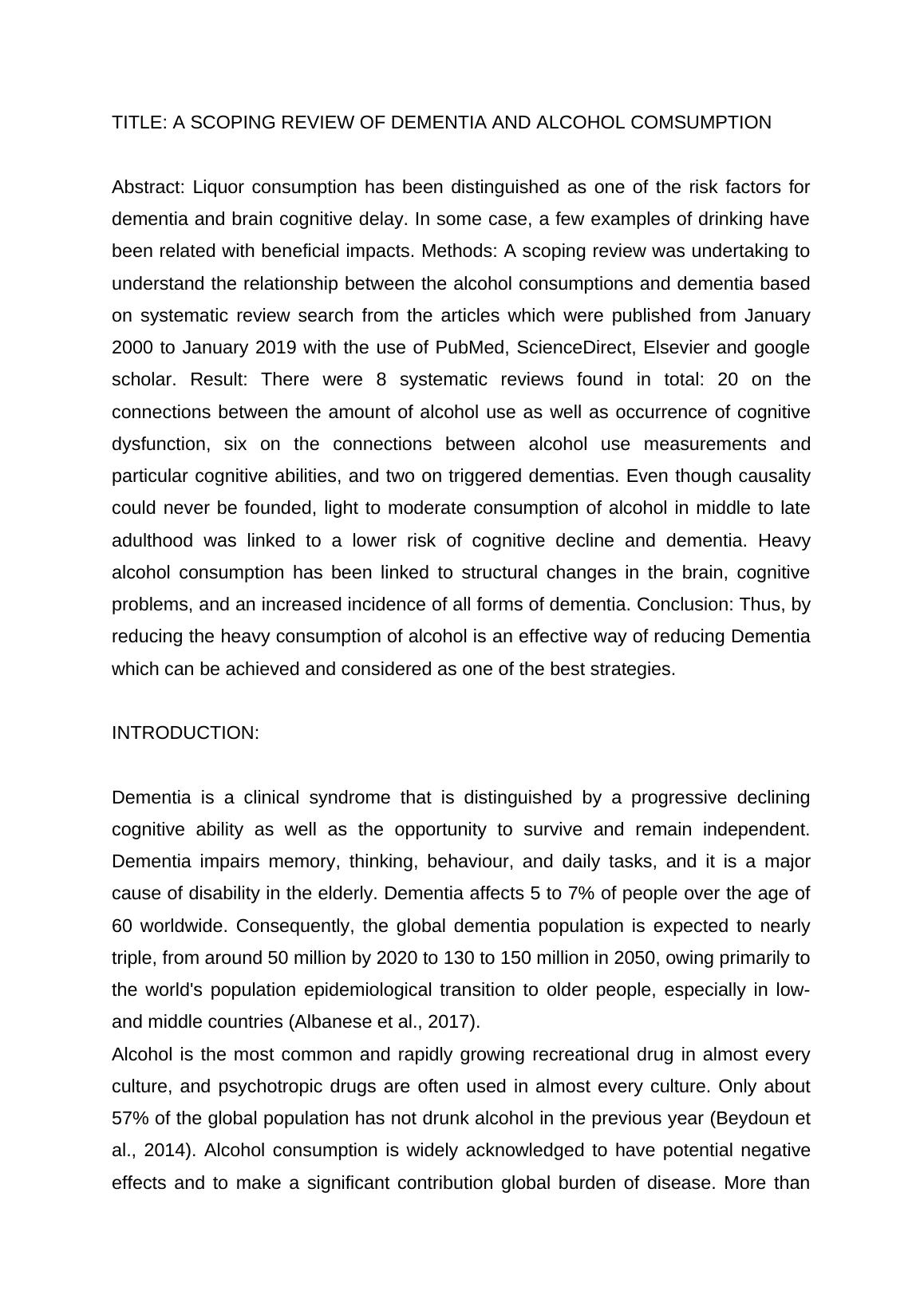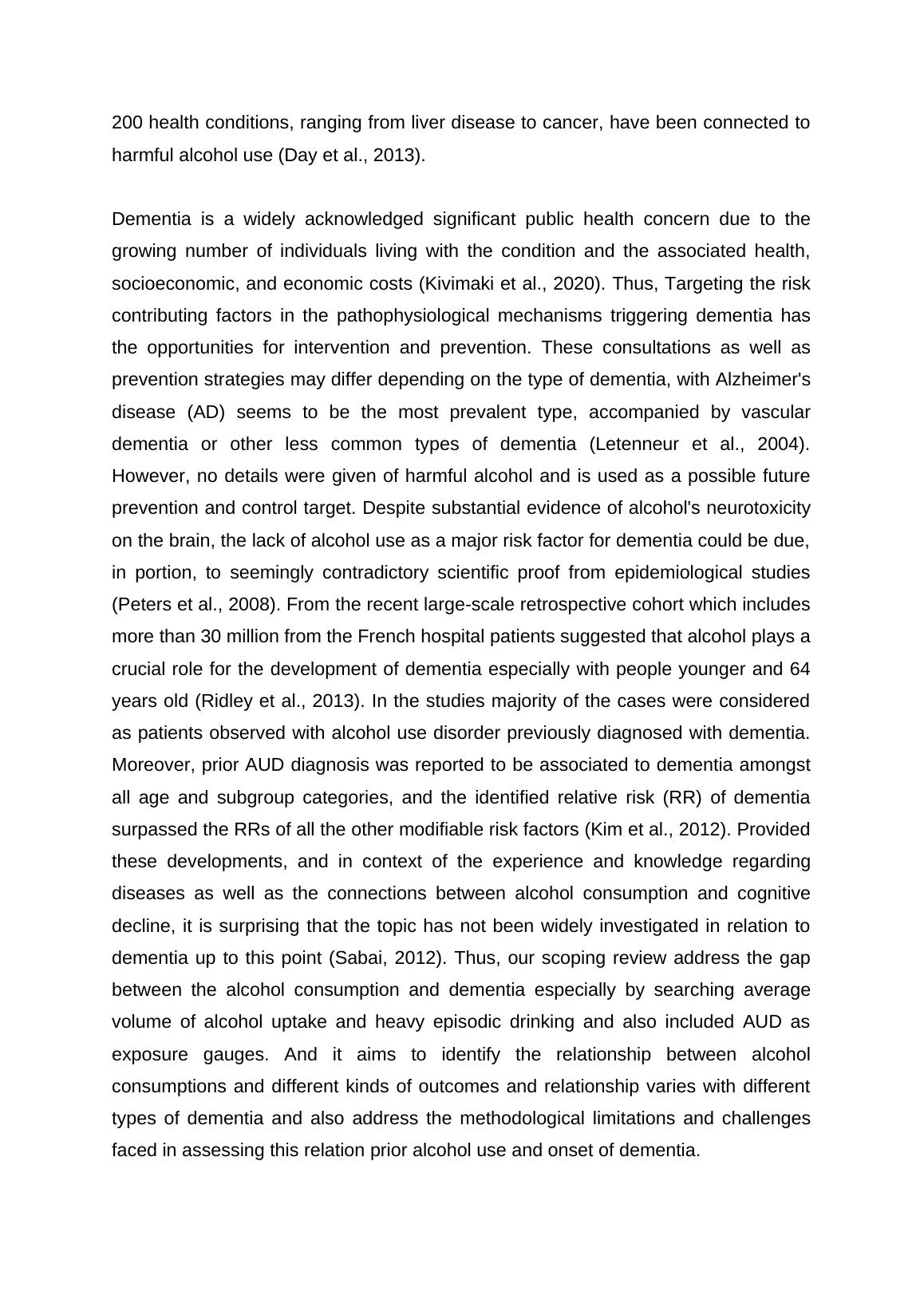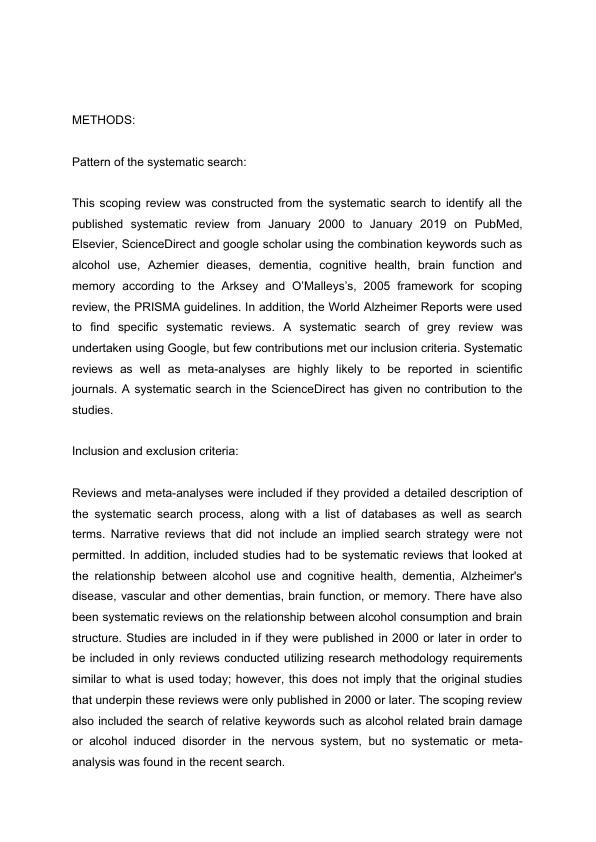Assessment and Consultation in Clinical Settings
Added on 2022-04-26
16 Pages4979 Words42 Views
MD7069 : ASSESSMENT AND CONSULTATION IN CLINICAL SETTINGS:
ASSESSMENT : SCOPING REVIEW
ASSESSMENT NUMBER : J87859
ASSESSMENT : SCOPING REVIEW
ASSESSMENT NUMBER : J87859

TITLE: A SCOPING REVIEW OF DEMENTIA AND ALCOHOL COMSUMPTION
Abstract: Liquor consumption has been distinguished as one of the risk factors for
dementia and brain cognitive delay. In some case, a few examples of drinking have
been related with beneficial impacts. Methods: A scoping review was undertaking to
understand the relationship between the alcohol consumptions and dementia based
on systematic review search from the articles which were published from January
2000 to January 2019 with the use of PubMed, ScienceDirect, Elsevier and google
scholar. Result: There were 8 systematic reviews found in total: 20 on the
connections between the amount of alcohol use as well as occurrence of cognitive
dysfunction, six on the connections between alcohol use measurements and
particular cognitive abilities, and two on triggered dementias. Even though causality
could never be founded, light to moderate consumption of alcohol in middle to late
adulthood was linked to a lower risk of cognitive decline and dementia. Heavy
alcohol consumption has been linked to structural changes in the brain, cognitive
problems, and an increased incidence of all forms of dementia. Conclusion: Thus, by
reducing the heavy consumption of alcohol is an effective way of reducing Dementia
which can be achieved and considered as one of the best strategies.
INTRODUCTION:
Dementia is a clinical syndrome that is distinguished by a progressive declining
cognitive ability as well as the opportunity to survive and remain independent.
Dementia impairs memory, thinking, behaviour, and daily tasks, and it is a major
cause of disability in the elderly. Dementia affects 5 to 7% of people over the age of
60 worldwide. Consequently, the global dementia population is expected to nearly
triple, from around 50 million by 2020 to 130 to 150 million in 2050, owing primarily to
the world's population epidemiological transition to older people, especially in low-
and middle countries (Albanese et al., 2017).
Alcohol is the most common and rapidly growing recreational drug in almost every
culture, and psychotropic drugs are often used in almost every culture. Only about
57% of the global population has not drunk alcohol in the previous year (Beydoun et
al., 2014). Alcohol consumption is widely acknowledged to have potential negative
effects and to make a significant contribution global burden of disease. More than
Abstract: Liquor consumption has been distinguished as one of the risk factors for
dementia and brain cognitive delay. In some case, a few examples of drinking have
been related with beneficial impacts. Methods: A scoping review was undertaking to
understand the relationship between the alcohol consumptions and dementia based
on systematic review search from the articles which were published from January
2000 to January 2019 with the use of PubMed, ScienceDirect, Elsevier and google
scholar. Result: There were 8 systematic reviews found in total: 20 on the
connections between the amount of alcohol use as well as occurrence of cognitive
dysfunction, six on the connections between alcohol use measurements and
particular cognitive abilities, and two on triggered dementias. Even though causality
could never be founded, light to moderate consumption of alcohol in middle to late
adulthood was linked to a lower risk of cognitive decline and dementia. Heavy
alcohol consumption has been linked to structural changes in the brain, cognitive
problems, and an increased incidence of all forms of dementia. Conclusion: Thus, by
reducing the heavy consumption of alcohol is an effective way of reducing Dementia
which can be achieved and considered as one of the best strategies.
INTRODUCTION:
Dementia is a clinical syndrome that is distinguished by a progressive declining
cognitive ability as well as the opportunity to survive and remain independent.
Dementia impairs memory, thinking, behaviour, and daily tasks, and it is a major
cause of disability in the elderly. Dementia affects 5 to 7% of people over the age of
60 worldwide. Consequently, the global dementia population is expected to nearly
triple, from around 50 million by 2020 to 130 to 150 million in 2050, owing primarily to
the world's population epidemiological transition to older people, especially in low-
and middle countries (Albanese et al., 2017).
Alcohol is the most common and rapidly growing recreational drug in almost every
culture, and psychotropic drugs are often used in almost every culture. Only about
57% of the global population has not drunk alcohol in the previous year (Beydoun et
al., 2014). Alcohol consumption is widely acknowledged to have potential negative
effects and to make a significant contribution global burden of disease. More than

200 health conditions, ranging from liver disease to cancer, have been connected to
harmful alcohol use (Day et al., 2013).
Dementia is a widely acknowledged significant public health concern due to the
growing number of individuals living with the condition and the associated health,
socioeconomic, and economic costs (Kivimaki et al., 2020). Thus, Targeting the risk
contributing factors in the pathophysiological mechanisms triggering dementia has
the opportunities for intervention and prevention. These consultations as well as
prevention strategies may differ depending on the type of dementia, with Alzheimer's
disease (AD) seems to be the most prevalent type, accompanied by vascular
dementia or other less common types of dementia (Letenneur et al., 2004).
However, no details were given of harmful alcohol and is used as a possible future
prevention and control target. Despite substantial evidence of alcohol's neurotoxicity
on the brain, the lack of alcohol use as a major risk factor for dementia could be due,
in portion, to seemingly contradictory scientific proof from epidemiological studies
(Peters et al., 2008). From the recent large-scale retrospective cohort which includes
more than 30 million from the French hospital patients suggested that alcohol plays a
crucial role for the development of dementia especially with people younger and 64
years old (Ridley et al., 2013). In the studies majority of the cases were considered
as patients observed with alcohol use disorder previously diagnosed with dementia.
Moreover, prior AUD diagnosis was reported to be associated to dementia amongst
all age and subgroup categories, and the identified relative risk (RR) of dementia
surpassed the RRs of all the other modifiable risk factors (Kim et al., 2012). Provided
these developments, and in context of the experience and knowledge regarding
diseases as well as the connections between alcohol consumption and cognitive
decline, it is surprising that the topic has not been widely investigated in relation to
dementia up to this point (Sabai, 2012). Thus, our scoping review address the gap
between the alcohol consumption and dementia especially by searching average
volume of alcohol uptake and heavy episodic drinking and also included AUD as
exposure gauges. And it aims to identify the relationship between alcohol
consumptions and different kinds of outcomes and relationship varies with different
types of dementia and also address the methodological limitations and challenges
faced in assessing this relation prior alcohol use and onset of dementia.
harmful alcohol use (Day et al., 2013).
Dementia is a widely acknowledged significant public health concern due to the
growing number of individuals living with the condition and the associated health,
socioeconomic, and economic costs (Kivimaki et al., 2020). Thus, Targeting the risk
contributing factors in the pathophysiological mechanisms triggering dementia has
the opportunities for intervention and prevention. These consultations as well as
prevention strategies may differ depending on the type of dementia, with Alzheimer's
disease (AD) seems to be the most prevalent type, accompanied by vascular
dementia or other less common types of dementia (Letenneur et al., 2004).
However, no details were given of harmful alcohol and is used as a possible future
prevention and control target. Despite substantial evidence of alcohol's neurotoxicity
on the brain, the lack of alcohol use as a major risk factor for dementia could be due,
in portion, to seemingly contradictory scientific proof from epidemiological studies
(Peters et al., 2008). From the recent large-scale retrospective cohort which includes
more than 30 million from the French hospital patients suggested that alcohol plays a
crucial role for the development of dementia especially with people younger and 64
years old (Ridley et al., 2013). In the studies majority of the cases were considered
as patients observed with alcohol use disorder previously diagnosed with dementia.
Moreover, prior AUD diagnosis was reported to be associated to dementia amongst
all age and subgroup categories, and the identified relative risk (RR) of dementia
surpassed the RRs of all the other modifiable risk factors (Kim et al., 2012). Provided
these developments, and in context of the experience and knowledge regarding
diseases as well as the connections between alcohol consumption and cognitive
decline, it is surprising that the topic has not been widely investigated in relation to
dementia up to this point (Sabai, 2012). Thus, our scoping review address the gap
between the alcohol consumption and dementia especially by searching average
volume of alcohol uptake and heavy episodic drinking and also included AUD as
exposure gauges. And it aims to identify the relationship between alcohol
consumptions and different kinds of outcomes and relationship varies with different
types of dementia and also address the methodological limitations and challenges
faced in assessing this relation prior alcohol use and onset of dementia.

METHODS:
Pattern of the systematic search:
This scoping review was constructed from the systematic search to identify all the
published systematic review from January 2000 to January 2019 on PubMed,
Elsevier, ScienceDirect and google scholar using the combination keywords such as
alcohol use, Azhemier dieases, dementia, cognitive health, brain function and
memory according to the Arksey and O’Malleys’s, 2005 framework for scoping
review, the PRISMA guidelines. In addition, the World Alzheimer Reports were used
to find specific systematic reviews. A systematic search of grey review was
undertaken using Google, but few contributions met our inclusion criteria. Systematic
reviews as well as meta-analyses are highly likely to be reported in scientific
journals. A systematic search in the ScienceDirect has given no contribution to the
studies.
Inclusion and exclusion criteria:
Reviews and meta-analyses were included if they provided a detailed description of
the systematic search process, along with a list of databases as well as search
terms. Narrative reviews that did not include an implied search strategy were not
permitted. In addition, included studies had to be systematic reviews that looked at
the relationship between alcohol use and cognitive health, dementia, Alzheimer's
disease, vascular and other dementias, brain function, or memory. There have also
been systematic reviews on the relationship between alcohol consumption and brain
structure. Studies are included in if they were published in 2000 or later in order to
be included in only reviews conducted utilizing research methodology requirements
similar to what is used today; however, this does not imply that the original studies
that underpin these reviews were only published in 2000 or later. The scoping review
also included the search of relative keywords such as alcohol related brain damage
or alcohol induced disorder in the nervous system, but no systematic or meta-
analysis was found in the recent search.
Pattern of the systematic search:
This scoping review was constructed from the systematic search to identify all the
published systematic review from January 2000 to January 2019 on PubMed,
Elsevier, ScienceDirect and google scholar using the combination keywords such as
alcohol use, Azhemier dieases, dementia, cognitive health, brain function and
memory according to the Arksey and O’Malleys’s, 2005 framework for scoping
review, the PRISMA guidelines. In addition, the World Alzheimer Reports were used
to find specific systematic reviews. A systematic search of grey review was
undertaken using Google, but few contributions met our inclusion criteria. Systematic
reviews as well as meta-analyses are highly likely to be reported in scientific
journals. A systematic search in the ScienceDirect has given no contribution to the
studies.
Inclusion and exclusion criteria:
Reviews and meta-analyses were included if they provided a detailed description of
the systematic search process, along with a list of databases as well as search
terms. Narrative reviews that did not include an implied search strategy were not
permitted. In addition, included studies had to be systematic reviews that looked at
the relationship between alcohol use and cognitive health, dementia, Alzheimer's
disease, vascular and other dementias, brain function, or memory. There have also
been systematic reviews on the relationship between alcohol consumption and brain
structure. Studies are included in if they were published in 2000 or later in order to
be included in only reviews conducted utilizing research methodology requirements
similar to what is used today; however, this does not imply that the original studies
that underpin these reviews were only published in 2000 or later. The scoping review
also included the search of relative keywords such as alcohol related brain damage
or alcohol induced disorder in the nervous system, but no systematic or meta-
analysis was found in the recent search.

End of preview
Want to access all the pages? Upload your documents or become a member.
Related Documents
Maori inhabits in New Zealandlg...
|15
|4205
|19
Clinical Update on Dementia in Australialg...
|14
|3768
|345
Alcohol Consumption: A Case Study on Alcohol Dependence and its Effects on Physical and Mental Healthlg...
|14
|3728
|318